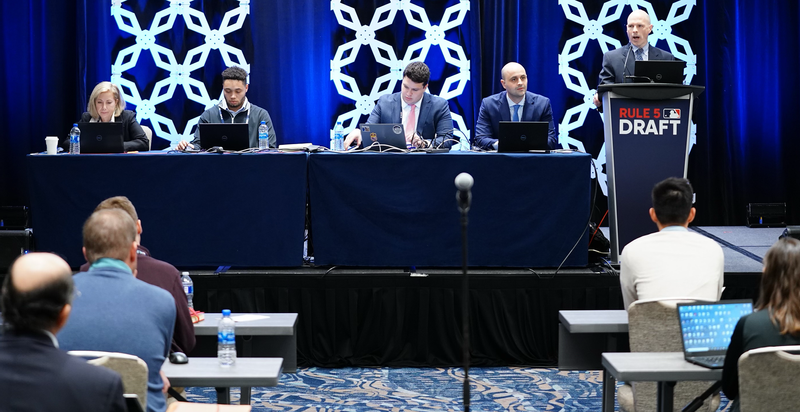Life After Playing: James Proctor and the MLB Diversity Fellowship Program
James Proctor (second from the left) working the MLB Rule 5 Draft
James Proctor knew.
After hurting his shoulder pitching, the doctors told him that after the surgery the recovery time would take 12-24 months.
He was 24-year-old pitcher in single A.
It was time to retire.
“It just didn’t make sense to me at this point in my life to spend the two years rehabbing for that one final shot,” said Proctor.
After playing, Proctor knew he wanted to stay in the game, so he reached out to his contacts. He heard about the Major League Baseball Diversity Fellowship program and applied for a spot at the commissioner’s office.
The program is designed to recruit talented professionals of diverse backgrounds who are recent graduates and are either just entering the workforce or still in the early phase of their careers to fill open positions in the Commissioner’s Office and 18 Major League clubs.
Proctor got the job and started in November. He’s split into two departments, Minor League Operations and Major/Minor League Transactions.
With Spring Training underway, Proctor is involved in roster management, specifically dealing with each team’s 40-man rosters. On the Minor League Operations side, he helps oversee the teams’ roster compliance and facility standards.
Once the season starts, the former Tiger will approve minor league transactions – players moving up or down levels or the signing of a free agent.
“Now is one of the most interesting times to be involved with Minor League Baseball,” said Proctor. “It’s rapidly changing with the facility standards being a big upgrade. There’s a lot more focus on development and with the shrinkage of clubs, more resources are being tightly dispersed between affiliates.”
As the paradigm of Major League Baseball shifts and it makes an emphasis on gaining younger fans, Proctor wants to be an asset in helping to make the game more diverse.
“I am passionate about getting others involved in the game,” said Proctor. “I like the league’s efforts to promote diversity with women and minorities. There are groups of people that don’t have access to the game right now and I think I have a lot to offer on both the playing and management side.”
While the work he is doing hasn’t been directly applicable to his major at Princeton, the University has had an impact on his time with the commissioner’s office.
“Princeton does a good job of teaching you how to learn,” said Proctor. “I’m able to absorb information and adapt on the fly because of Princeton and that is invaluable.”
Proctor hopes to join a deep Princeton alumni base in Major League Baseball front offices such Mark Shapiro ’89, President and CEO of the Toronto Blue Jays, and Mike Hazen ’98, Executive Vice President and General Manager of the Arizona Diamondbacks. He’s already met with Shapiro and Andrew Christie ’16, who’s in player development for the New York Mets.
Proctor is still in the early process of figuring out life after playing baseball, but he hopes this fellowship will help put him in the right direction.
“I was very honest in the interview process that I didn’t know exactly what I wanted to do in the game, but I’m passionate about it and want to be involved,” said Proctor. “If coming out of this fellowship, I will consider it a successful 18 months if I have a clear director within baseball operations.”
No matter what happens to Proctor once the fellowship ends, there is one former big leaguer who will be proud of him, no matter what.
Former Detroit Tiger, Jim Proctor, his grandfather. Jim was one of the first black players to play for the Tigers.
“He loved it,” said James about his grandfather’s thoughts on his fellowship. “It was something he was very proud of because he knew what it was like to be denied opportunities and knows how it was even harder to break into baseball operations especially for minorities. Getting this opportunity made him really happy.”












